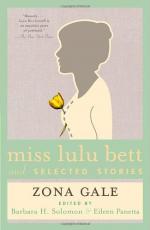Lulu had heard, stricken. She passed them by, responding only faintly to their greeting. Di was far less taken aback than Lulu.
Later Di had said to Lulu: “I s’pose you heard what we were saying.”
Lulu, much shaken, had withdrawn from the whole matter by a flat “no.” “Because,” she said to herself, “I couldn’t have heard right.”
But since then she had looked at Di as if Di were some one else. Had not Lulu taught her to make buttonholes and to hem—oh, no I Lulu could not have heard properly.
“Everybody’s got somebody to be nice to them,” she thought now, sitting by the kitchen window, adult yet Cinderella.
She thought that some one would come for her. Her mother or even Ina. Perhaps they would send Monona. She waited at first hopefully, then resentfully. The grey rain wrapped the air.
“Nobody cares what becomes of me after they’re fed,” she thought, and derived an obscure satisfaction from her phrasing, and thought it again.
Ninian Deacon came into the kitchen.
Her first impression was that he had come to see whether the dog had been fed.
“I fed him,” she said, and wished that she had been busy when Ninian entered.
“Who, me?” he asked. “You did that all right. Say, why in time don’t you come in the other room?”
“Oh, I don’t know.”
“Well, neither do I. I’ve kept thinking, ‘Why don’t she come along.’ Then I remembered the dishes.” He glanced about. “I come to help wipe dishes.”
“Oh!” she laughed so delicately, so delightfully, one wondered where she got it. “They’re washed——” she caught herself at “long ago.”
“Well then, what are you doing here?”
“Resting.”
“Rest in there.” He bowed, crooked his arm. “Senora,” he said,—his Spanish matched his other assimilations of travel—
“Senora. Allow me.”
Lulu rose. On his arm she entered the parlour. Dwight was narrating and did not observe that entrance. To the Plows it was sufficiently normal. But Ina looked up and said:
“Well!”—in two notes, descending, curving.
Lulu did not look at her. Lulu sat in a low rocker. Her starched white skirt, throwing her chally in ugly lines, revealed a peeping rim of white embroidery. Her lace front wrinkled when she sat, and perpetually she adjusted it. She curled her feet sidewise beneath her chair, her long wrists and veined hands lay along her lap in no relation to her. She was tense. She rocked.
When Dwight had finished his narration, there was a pause, broken at last by Mrs. Bett:
“You tell that better than you used to when you started in telling it,” she observed. “You got in some things I guess you used to clean forget about. Monona, get off my rocker.”
Monona made a little whimpering sound, in pretence to tears. Ina said “Darling—quiet!”—chin a little lifted, lower lip revealing lower teeth for the word’s completion; and she held it.




